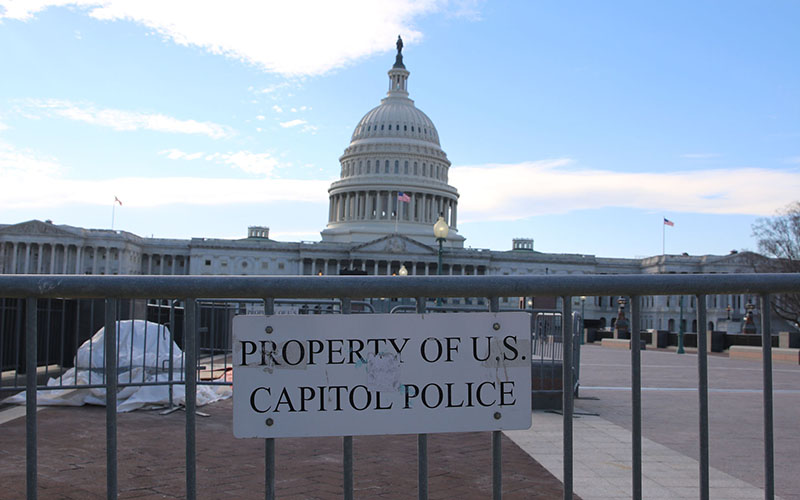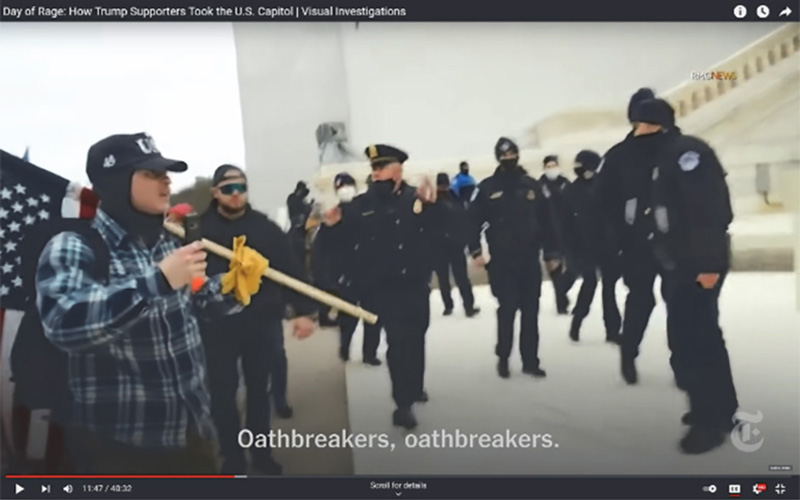
The effects of the Jan. 6 assault on the U.S. Capitol are still occasionally felt in Washington, with police earlier this month reinstalling fencing and putting National Guard troops on standy in advance of President Joe Biden’s first State of the Union address. Nine Arizona residents have been charged in the Jan. 6 attack, and four have pleaded guilty so far. (File photo by Emily Sacia/Cronkite News)
WASHINGTON – An Arizona man was sentenced Thursday to 36 months of probation and will have to spend 90 days in a halfway house for his part in the Jan. 6 insurrection at the Capitol.
U.S. District Judge Randolph Moss also ordered Micajah Joel Jackson to pay $1,000 in fines and $500 in restitution, noting at sentencing that Jackson was “at the forefront” of the “horrific events” of the day.
“You were at the forefront, you were at the top of the stairs, you were the first to enter the Senate wing door, you were on the threshold of the House chambers,” Moss said. “You were in the midst of it and you knew you shouldn’t be and there’s no denying that.”
But Moss did not impose the 60 days of jail time requested by prosecutors, who said Jackson has failed to show remorse for his actions. And Jackson, who pleaded guilty to one count of “parading, demonstrating or picketing in a Capitol building” for his part in the attack, only said at sentencing that he wants “to move on with my life.”
Jackson, 26, is one of nine Arizona residents charged in connection with the Jan. 6 attack on the Capitol, when thousands of protesters marched from a rally near the White House where then-President Donald Trump repeated his claims that the election had been stolen.
Trump urged the crowd to march on the Capitol, where Congress was meeting to certify President Joe Biden’s victory, telling the mob they would “never take back our country with weakness.”

Court papers show a screen grab of a New York Times video of the Jan. 6 attack that prosecutors say shows Micajah Joel Jackson, left, confronting police on the west front of the Capitol. (Photo courtesy Justice Department)
The crowd quickly overwhelmed a vastly outnumbered Capitol Police force, which was defending the Capitol with little more than portable fencing, and hundreds eventually forced their way into the building. The assault sent lawmakers, and then-Vice President Mike Pence, scrambling for safety and halted the certification of the election for hours.
In the months since, federal officials have arrested more than 775 people who face charges ranging from being in a restricted area to seditious conspiracy. The Justice Department said that 224 have pleaded guilty, most to misdemeanor charges connected with the breach.
Jackson originally faced four counts, including knowingly entering a restricted building, disorderly and disruptive conduct, and violent entry and disorderly conduct in a Capitol building. He agreed to plead guilty in October to the “parading, demonstrating or picketing” charge, a misdemeanor offense that carries a maximum sentence of six months imprisonment and $5,000 in fines.
Court documents say Jackson, a Marine Corps veteran, traveled alone from Arizona to Washington to protest the certification of the 2020 election results. Charging documents include photos and video from social media that show Jackson, masked and carrying a flag, marching down the National Mall with members of the Proud Boys from Arizona.
The prosecutor said Jackson was wearing an orange armband that the Proud Boys used to identify themselves. Jackson has said he is not affiliated with the right-wing group but was merely walking with them that day, but prosecutors dispute that claim, pointing to photos on Proud Boy social media sites where Jackson is shown posing with members of the group in the months before Jan. 6.
Jackson wound up in the Capitol as part of the insurrection, even though he knew he was not allowed and should not have been there, he acknowledged in court documents.
At Thursday’s hearing, Moss called Jackson’s actions that day a “huge, huge mistake.”
“I’m not saying that huge mistake that you made that day is something that is an indelible issue for your character, but I think it’s something you have to recognize,” Moss said.
Jackson said little, and what he did say fell short of an apology.
“It’s been a really stressful, long year dealing with a lot of disabilities from the military. I’d like to move on with my life and do what I have to do as a young man, keep learning,” he said to the judge.
Moss repeatedly questioned Jackson’s sincerity and remorse during the half-hour hearing. That was echoed by Assistant U.S. Attorney Sean Murphy, who said Jackson’s claim that he did not take part in “any of the mayhem that occurred … just isn’t how it happened.”
But Jackson’s attorney, Maria Jacob, said her client “chose to follow the problems that day” and “was not a member of the problem.”
She asked Moss to impose a sentence of two years of probation, compared to Murphy’s request for jail time and three years of probation.
Ultimately, Moss handed down a sentence of three years probation with time in a halfway house, noting that Jackson “didn’t engage in any violence” on Jan. 6. But Moss reiterated to Jackson that the events of Jan. 6 will always remain a “chilling moment in history.”
“I don’t think any of us in our lifetime will … ever see it again, a moment in which you question whether our democracy is under assault, and whether in fact, we are not going to have a peaceful transition of power in the country,” Moss said.

